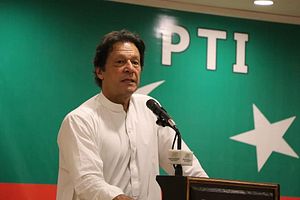U.S. President Donald Trump and Pakistani Prime Minister Imran Khan are set to meet next week at the White House, in what will be Khan’s first trip to Washington D.C. since becoming prime minister. While the agenda will be dominated by the ongoing Afghan peace talks and Pakistan’s counterterrorism efforts, the most important part of the meeting will be whether Khan and Trump get along.
Khan and Trump are celebrity-politicians who share a common worldview and have disrupted the old way of doing politics in their respective countries. They are political outsiders – Trump more so than Khan, who has been in politics for years – and believe that their political opponents should be locked up. They also believe that America should end its military engagements abroad and have consistently echoed the view that the wars in Afghanistan and Iraq have been disastrous.
While Trump has not managed to put his political opponents in jail, Khan has fared much better, with leading opposition politicians, including two former prime ministers, currently behind bars. Trump has also branded the media as the enemy of the people, but Khan has gone much further: outlets that are critical of the Pakistani government and security establishment have faced censorship and increasing pressure in recent months. Both men also seek to reinvent past glory: Trump’s slogan is “Make America Great Again” while Khan seeks to re-establish the state of Medina to restore a mythical glorious past. And finally, both men have used their stardom and fame to climb the political ranks and shun the traditional political playbook.
Given these common traits and beliefs, one can expect that both leaders will get along and develop a strong personal relationship.
In his meeting with Trump, Khan will surely talk about the trillions of dollars wasted by the United States in Afghanistan and appeal to Trump’s instinct that this war must end. Khan will highlight Pakistan’s positive role in the ongoing Afghan peace process and state his belief that negotiations are the only way to resolve this conflict. This view closely aligns with Trump’s core instincts, and this alignment may go a long way in making Trump believe that Khan is another leader who agrees with his instincts.
Like Pakistani leaders before him, Khan will raise Pakistan’s own sacrifices made in the war against terror and talk about the tens of thousands killed in Pakistan since the war in Afghanistan began. Unlike predecessors, Trump does not know much about the region’s history – his tweet about Hafiz Saeed’s latest arrest is evidence of this – and may be more forthcoming than previous U.S. presidents in recognizing Pakistan’s support in the ongoing war on terror.
While Trump has called the Iran nuclear agreement a bad deal and has withdrawn the United States from the agreement, he has tried to control hawks in his cabinet who seek regime change in Iran. Khan has often talked about reducing tensions in the Muslim world and he genuinely believes that the region can ill afford another conflict. The two leaders may discuss Iran during their conversation and agree on the fact that war with Iran would be disastrous for all parties. If Iran were to come up, Khan may, as he has in the past, showcase a willingness to play the role of a mediator.
The fact that both men do not like to read dense briefing materials with background and talking points makes their meeting a risky but exciting affair. Setting a detailed agenda that seeks to contain these personalities is going to be a futile exercise, and this meeting will be more of a personal interaction between two disruptive leaders rather than leaders of two countries that have had a troubled relationship.
While it will not change the course of the U.S.-Pakistan relationship, this meeting must be considered a success if both Trump and Khan develop a personal rapport, as their personal relationship will ultimately play a critical role in shaping the future of Afghanistan. As the Afghan peace process draws on and negotiators get into the weeds, obstacles, particularly those related to assuaging Pakistani concerns about the Afghan endgame, will only be solved by leaders who trust each other and want to reach a deal.
When Nawaz Sharif met with Barack Obama in Washington, the two leaders were unable to build a relationship. Sharif, seen reading his remarks from a small piece of paper, was ridiculed by his political opponents, and the Pakistani media had a field day as well. This time around, while a muzzled Pakistani media will scrutinize next week’s meeting, it may spend more time talking about the fact that both leaders developed a strong personal relationship that may prove critical in ending the war in Afghanistan.
Uzair Younus is a Director at Albright Stonebridge Group. Views expressed are his own.

































